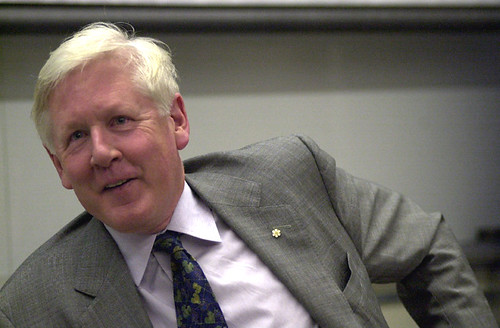NDP Leader Jack Layton says he is “heartened” that a British commander believes that the war in Afghanistan is not winnable and that there should be a dialogue with the Taliban.Setting aside the moral vacuum one would have to inhabit to be "heartened" to hear that the Afghan struggle is not winnable, there are two immediate problems with that sentence. The first is that the British commander in question, Brig.-Gen. Carleton-Smith, did not say the war is not winnable. The second is that he did not say, as the sentence necessarily implies, that we should leave off the "war" stuff and just negotiate with the Taliban.
I know we're all supposed to tolerate the dumbing-down of election-campaign news
"in this era of Googles," but I'm sorry, this is absolutely ridiculous. Carleton-Smith didn't even say anything newsworthy.
As is evident from the second paragraph of the
Times of London article where Carleton-Smith's comments first appeared, what's happening here is that the Times is trying to extricate itself from the embarrassment of having taken seriously a "parody" of a second-hand report from a French diplomat about an opinion a British diplomat denies he ever expressed in a rumpus that
originally appeared in an obscure French satirical weekly, Le Canard Enchaîné.And now, the Times' efforts to dig itself out of that hole by digging itself deeper into it are sending such tremors through the news wires that Jack Layton has taken the opportunity to enlist some deadline-harried campaign reporters in his claim that he's been right about Afghanistan all along, and is thus heartened that some British general has finally seen the light and agrees with him.
Unfortunately for all concerned, when you get through the spins, all that's left is a guy named Carleton-Smith has reiterated the Karzai government's long-standing approach to the Taliban "insurgency," and has reiterated the long-standing approach underlying the purpose of the UN-sanctioned International Security Assistance Force in Afghanistan - an approach Jack Layton loudly and irrationally opposes.
If Layton no longer opposes the UN-ISAF strategy, then that would be big news. If Carleton-Smith really agrees with Jack Layton, that would be huge news. But for either of these things to be true, you'd have to be living in a parallel universe.
Nobody has ever said there was a "military solution" to the problems that beset Afghanistan, and in this way, the Globe story is just another in a long line of free passes the news media has handed Layton on the question. But this one is particularly absurd.
It's not just because Layton is being allowed to get away with the rubbish about a British general agreeing with him. It's because Layton is now suggesting that the NDP's position is merely that "the prosecution of the continued war effort has got to be changed." In fact, for more than two years, rather than counsel some change in the way the "war" is prosecuted (which could be the basis of a respectable and useful left-wing critique, if the NDP could actually get around to formulating one), the NDP has opted instead for hippie sloganeering. It's all "George Bush's war,"
support our troops, bring them home.All along, the UN-sanctioned ISAF mission in Afghanistan has been carrying out the explicit and detailed instructions enumerated in the Afghanistan Compact - a covenant between the Afghan government and 60 donor nations. All along, it has been about building up a functioning state sufficient to hold its own, militarily, against warlordism, banditry, and Islamist terror. That's the approach Carleton-Smith is explaining here. That is precisely the approach Layton most noticeably and foolishly opposes.
Layton would truly have something to be "heartened" about had Carleton-Smith said that we should all renege on our commitments under the Afghanistan Compact, and that Canada should renege on its commitments to the UN, and to the beleaguered Afghan government, and just sit down with the Taliban and cut the quickest deal to get the 39-member ISAF coalition out of there. That is, after all, exactly what Layton has counseled. But that is not what Carleton-Smith is saying. Not even close.
And let's not forget that the Taliban isn't interested in negotiations, and they've made that clear, but still, Carleton-Smith quite reasonably hopes and expects that eventually, the Taliban leadership will be crushed to the point at which its only choice is to negotiate or die. Let's also not forget that this is a prospect that isn't even possible to contemplate under Layton's approach, which requires that the Taliban's international adversaries should first withdraw their troops, and then disarm themselves, and then return with some sort of list of demands.
Carleton-Smith makes it clear that ISAF's military role is to keep hammering at the Taliban, "reducing it to a manageable level of insurgency that’s not a strategic threat and can be managed by the Afghan army.” This is not what Layton has called for. Layton has called for the opposite. What Carelton-Smith calls for is the good sense of an approach that Layton has churlishly dismissed as a
"George Bush-style seek and kill mission."So, if there is some news here, it's either that Layton has had some astonishing change of heart, or he's been lying to us all along, which would mean, either way, that the Globe and Mail and the CBC and the rest just missed the biggest story of the campaign so far, if not the biggest story in Jack Layton's entire career. More likely, there is no real news here at all.
More likely, this is a non-story about a non-event arising from something Jack Layton says he happily agrees with in what a British brigadier-general did not in fact say, and it all started with the bad news judgment involved in taking seriously a translation of a report in a French satirical magazine about a second-hand account by a French diplomat, which is merely a disputed version of a statement a British envoy denies ever having made in the first place.
But that is what we call political "journalism" these days. It's supposed to help us make our decisions when we go to the polls.
Good luck with it.
UPDATE:
Bob Rae talks some sense.
UPDATE II: Afghan Defence Minister Abdul Rahim Wardak,
in a statement that exposes the folly of Jack Layton's proclamations, but closely echoes Carleton-Smith's observation, says: The war will be won by political, economic and military means.
UPDATE III: For any of you who still think that the "progressive" way forward in Afghanistan is to withdraw our troops and then return with complimentary Raffi CDs and offers to facilitate love-ins among the warring factions, here's something
you might not have noticed: A senior Taliban officer is spurning calls for negotiation from Afghanistan's government, calling President Hamid Karzai a U.S. "puppet" amid rumblings that peace talks could be in the offing.
 This was the scene I came upon this morning at the Ministry of Information and Culture headquarters here in Kabul. I took this photograph about an hour after the bombing, and it was still a madhouse.
This was the scene I came upon this morning at the Ministry of Information and Culture headquarters here in Kabul. I took this photograph about an hour after the bombing, and it was still a madhouse.













